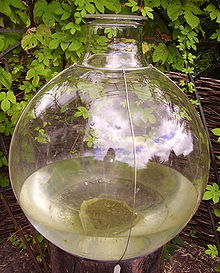Biosphere model

In climate science, a biosphere model, is used to model the biosphere of Earth, and can be coupled with atmospheric general circulation models (GCMs) for modelling the entire climate system. It has been suggested that terrestrial biosphere models (TBMs) are a more inclusive term than land surface models (LSMs).[1] The representation of roots in TBMs (or LSMs), however, remains relatively crude. Particularly, the dynamic functions of roots and phylogenetic basis of water uptake remain largely absent[2][3] in TBMs (or LSMs).
Models
[edit]The Daisyworld computer simulation from 1983, calculated how radiant energy increased or decreased, dependent on the albedo effect, based on changes in the biosphere.[4]
The Simple Biosphere (SiB) model, presented by Sellers et al. in 1986, calculates transfer of energy, mass and momentum of the atmosphere and the vegetated surface of the Earth. The model is designed for use in atmospheric general circulation models, to account for the related climate attribution of the biosphere.[5] A revised version was published in 1996 and incorporates satellite measurements.[6]
The Ent Dynamic Terrestrial Biosphere Model is a global vegetation model for use with the Earth System Modeling Framework.[7]
See also
[edit]References
[edit]- ^ Warren, Jeffrey M.; Hanson, Paul J.; Iversen, Colleen M.; Kumar, Jitendra; Walker, Anthony P.; Wullschleger, Stan D. (January 2015). "Root structural and functional dynamics in terrestrial biosphere models – evaluation and recommendations". New Phytologist. 205 (1): 59–78. doi:10.1111/nph.13034. ISSN 0028-646X. PMID 25263989.
- ^ Iversen, Colleen M. (August 2014). "Using root form to improve our understanding of root function". New Phytologist. 203 (3): 707–709. doi:10.1111/nph.12902. ISSN 0028-646X. PMID 25040729.
- ^ Knighton, James; Fricke, Evan; Evaristo, Jaivime; Boer, Hugo Jan; Wassen, Martin Joseph (2021-09-28). "Phylogenetic Underpinning of Groundwater Use by Trees" (PDF). Geophysical Research Letters. 48 (18). doi:10.1029/2021GL093858. ISSN 0094-8276.
- ^ Wood, Andrew J.; G.J. Ackland; J.G. Dyke; H.T.P. Williams; T.M. Lenton (2008-01-05). "Daisyworld: A review". Reviews of Geophysics. 48 (RG1001). American Geophysical Union: RG1001. Bibcode:2008RvGeo..46.1001W. doi:10.1029/2006RG000217.
- ^ Sellers; et al. (1986). "A simple biosphere model (SiB) for use within general circulation models". Journal of the Atmospheric Sciences. 43 (6): 505–531. doi:10.1175/1520-0469(1986)043<0505:ASBMFU>2.0.CO;2.
- ^ Sellers; et al. (1996). "A Revised Land Surface Parameterization (SiB2) for Atmospheric GCMS. Part II: The Generation of Global Fields of Terrestrial Biophysical Parameters from Satellite Data". Journal of Climate. 9: 707–737. doi:10.1175/1520-0469(1986)043<0505:ASBMFU>2.0.CO;2.
- ^ "Ent Dynamic Terrestrial Biosphere Model". Goddard Institute for Space Physics. NASA. Retrieved 27 August 2017.
Further reading
[edit]- Fisher, Joshua B.; Huntzinger, Deborah N.; Schwalm, Christopher R.; Sitch, Stephen (17 October 2014). "Modeling the Terrestrial Biosphere". Annual Review of Environment and Resources. 39 (1): 91–123. doi:10.1146/annurev-environ-012913-093456.
